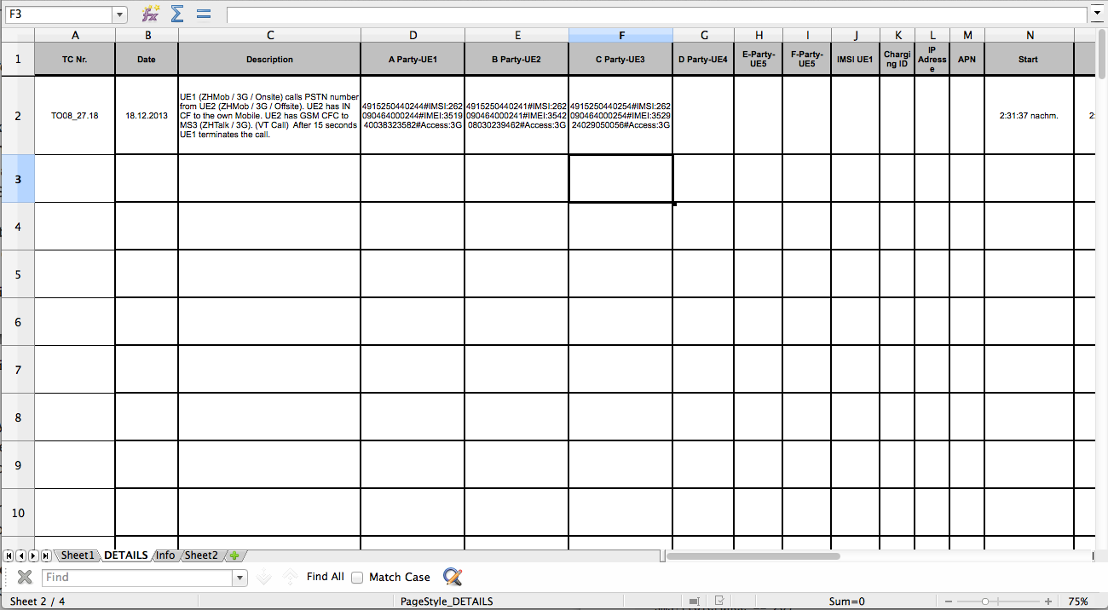Offline Verification Configuration¶
Configuration for offline verification using the intaQt Verifier UI uses a file called project.config, which is automatically created in a project's root folder when creating a new project in the Verifier UI.
Note that in the project.config, strings are not enclosed within quotation marks.
Syntax
1 2 3 4 5 6 7 8 9 10 11 12 13 14 15 16 17 18 19 20 21 22 23 24 25 | ticket.format = <Text> tickets = <Text>|<Format>, ... environment = <Text>.xls function.folder = <Text> testcases = <Text>.xls testcase.filters = <Text>, ... testcases.folder = <Text> report.config = <Text> report.output = <Text> report.template = <Text> report.outputMode = <Text> report.smartSummaryThreshold = <Text> report.ticketOrder = <Text>, ... report.archived = <Boolean> report.generateDataReport = <Boolean> report.requireAllRulesAreApplied = <Boolean> report.requireAllEntriesAreVerified = <Boolean> report.run.output.folder = <Text> templates.folder = <Text> template.prefix = <Text> template.suffix = <Text> |
Parameters
The following ticket format fields configure the tickets to be applied:
-
ticket.Format - Specifies the tickets' formats. Ticket format will be determined in the project-specific file in the project's documentation.
-
tickets - Points to the folder that contains the tickets being used for the test case.
- format (Optional) - If tickets should have a different format applied than that specified in the
ticketformatconfiguration, this can be defined by placing a pipe (|) after the ticket directory name, followed by that format. E.g./02tickets|QITASC2.
- format (Optional) - If tickets should have a different format applied than that specified in the
Optional Parameters
-
environment - Points to the Excel file where the environmental variables can be set.
-
function.folder - Points to the directory that holds Functions for Rules defined for verification.
The following optional test cases fields configure the test cases to be verified:
-
testcases - The Excel file that contains test cases to be run in Verification. By default, this file is called
testcases.xlsand stored in the project's root directory. -
testcase.filters - Filters the test cases that will be verified. If set to
"PASSED", only test cases that previously passed when executed by intaQt will be verified. Others will be ignored. -
testcases.folder - Points to the default directory that contains the rules for all test cases. The specified folder path must be relative to the project root. If left unspecified, a default root directory is used.
Note: Legacy reporting fields are still backwards compatible with intaQt, but it is recommend to use the fields shown above.
The following optional report fields configure Verification report output:
-
report.config - Defines the order that properties will be written in, and also allows for setting formatting preferences.
-
report.output - Defines the report's name. The report's full file name will include the report's name, timestamp and extension. E.g.
myverificationreport.html2015-09-07_TC03.html. -
report.template - Points to the directory where the user-created report template is stored.
- HTML report templates can be created using FreeMarker.
-
report.outputMode - The type of report summary. May be one of:
SMART(default) - The full report unless the file is too large. If so, theSUMMARYreport will be used instead. When using theSMARToption, thereport.smartSummaryThresholdmay also be set to specify the the number of tickets, above which theSUMMARYoutput is used instead ofFULL.FULL- The full report.SUMMARY- The summary report.
-
report.smartSummaryThreshold - The number of tickets above which a
SUMMARYreport will be used in place of a full report when using theSMARTsetting inreportOutputMode. Default:100. -
report.ticketOrder - List of ticket types in order they have to appear in reports.
-
report.archived - If
true(default), reports are archived,falseotherwise. -
report.generateDataReport - If
true(default) generatesjson-formatted report for being represented in the Verification client or to be used anywhere else where JSON is more preferable.falseotherwise. -
report.requireAllRulesAreApplied - If
true(default) all rules defined must be applied to at least one variable in the test case. This means that if a rule is not applied, the test case will fail.falseallows the test case to pass even if certain rules are not applied. -
report.requireAllEntriesAreVerified - If
true(default) checks for all properties to be checked. If some properties of tickets where not checked, verification fails.falseotherwise. -
report.run.output.reportFolder - Saves all reports that are generated when the QiTASC Trigger is started when test cases are run from an
.xlssheet.
The following optional templates field configure rules templates and their folders:
-
templatesFolder - Points to a folder containing rule files to be used as templates, included in other rule files. The specified folder path should be relative to the project root.
-
templatesPrefix and templatesSuffix - Specify which rules files in the
templates.folderare available based on a defined prefix or suffix:templates.prefix = TYPEwill open all rules files whose names start withTYPE, e.g.TYPE_name.rules.templates.suffix = TYPEwill open all rules files whose names end with withTYPE, e.g.name_TYPE.rules.
Example
1 2 3 4 5 6 7 8 9 10 11 12 13 | tickets = /01tickets, /02tickets|QITASC2 ticket.format = QITASC environment = environment.xls testcases = testcases.xls testcase.filters = PASSED report.config = moc, nested/mtc report.output = 03_verificationResults/MyProject_ report.ticketOrder = MOC, MTC report.config.requireAllRulesAreApplied = false report.run.output.folder = testFolder |
Environment File ¶
The environment file is an Excel file containing values to be used throughout the entire project, which might need to be changed. These changes are then applied to rules throughout the project where the value is used.
For example, a the variable timeZone with the value of UTC+1, and changing it to UTC+2 when the time changes one hour forward.

For example, the expression name timeTolerance with the value 20000000 could be applied in a test case as follows:
1 | check "Rules Name" equals ${env.timeTolerance"}; |
Test Cases File ¶
The test cases file is an Excel file that contains information in its DETAILS sheet about the project's executed test cases such as details about which number was used for a calling party, start times, and event types. This data can then be used in the rules. E.g. . check "RECIPIENT_NUMBER" against "CC.NDC.NUMBER" based on ${testcase.bParty.number};..
